Case Study Report: Law for Business Managers (LAW011-1) - Bedfordshire
VerifiedAdded on 2022/12/29
|11
|3730
|34
Report
AI Summary
This report provides a comprehensive analysis of three case scenarios related to business law. The first case examines the roles, duties, and legislative provisions governing a company director, specifically focusing on the Companies Act 2006 and the director's responsibilities. The second case delves into employment contracts, exploring the process of dismissing an employee and whether a director can terminate an employment contract based on an employee's performance and conduct. The report references the Employment Rights Act 1996. The third case explores alternative dispute resolution (ADR) methods. The report covers various aspects of business law to provide a thorough understanding of legal principles relevant to business management. The report is designed to help students understand the practical application of legal concepts in a business context.
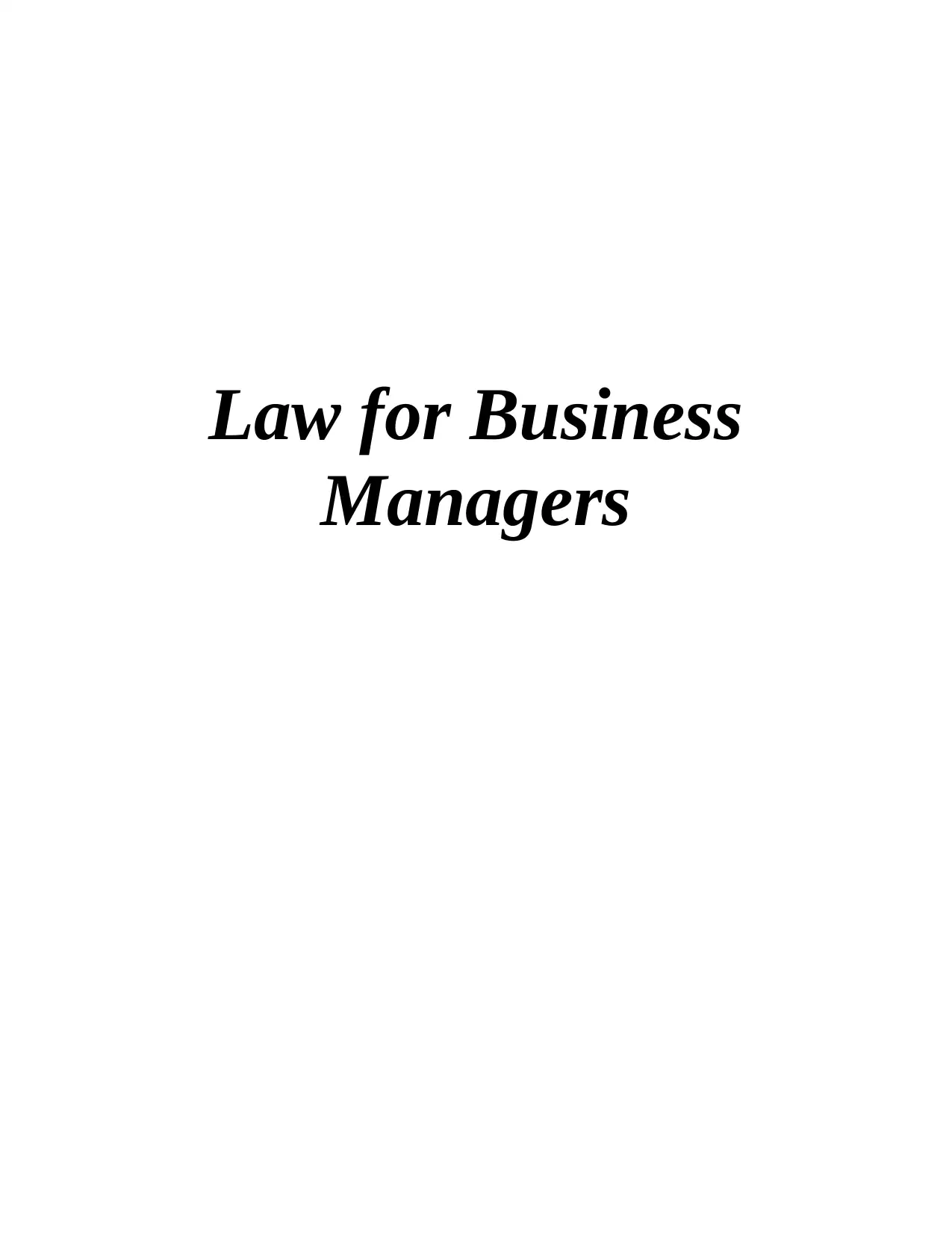
Law for Business
Managers
Managers
Paraphrase This Document
Need a fresh take? Get an instant paraphrase of this document with our AI Paraphraser
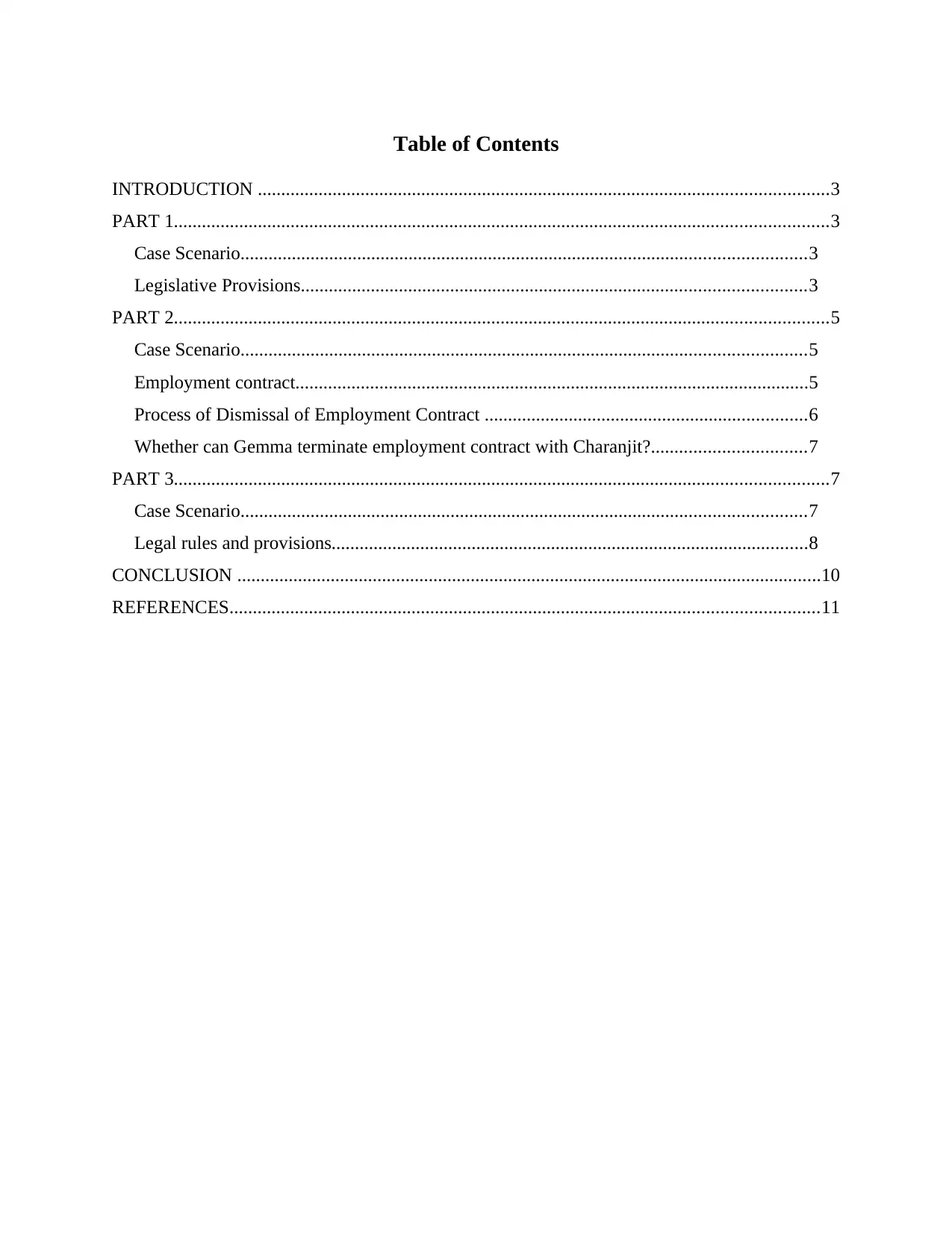
Table of Contents
INTRODUCTION ..........................................................................................................................3
PART 1............................................................................................................................................3
Case Scenario.........................................................................................................................3
Legislative Provisions............................................................................................................3
PART 2............................................................................................................................................5
Case Scenario.........................................................................................................................5
Employment contract..............................................................................................................5
Process of Dismissal of Employment Contract .....................................................................6
Whether can Gemma terminate employment contract with Charanjit?.................................7
PART 3............................................................................................................................................7
Case Scenario.........................................................................................................................7
Legal rules and provisions......................................................................................................8
CONCLUSION .............................................................................................................................10
REFERENCES..............................................................................................................................11
INTRODUCTION ..........................................................................................................................3
PART 1............................................................................................................................................3
Case Scenario.........................................................................................................................3
Legislative Provisions............................................................................................................3
PART 2............................................................................................................................................5
Case Scenario.........................................................................................................................5
Employment contract..............................................................................................................5
Process of Dismissal of Employment Contract .....................................................................6
Whether can Gemma terminate employment contract with Charanjit?.................................7
PART 3............................................................................................................................................7
Case Scenario.........................................................................................................................7
Legal rules and provisions......................................................................................................8
CONCLUSION .............................................................................................................................10
REFERENCES..............................................................................................................................11
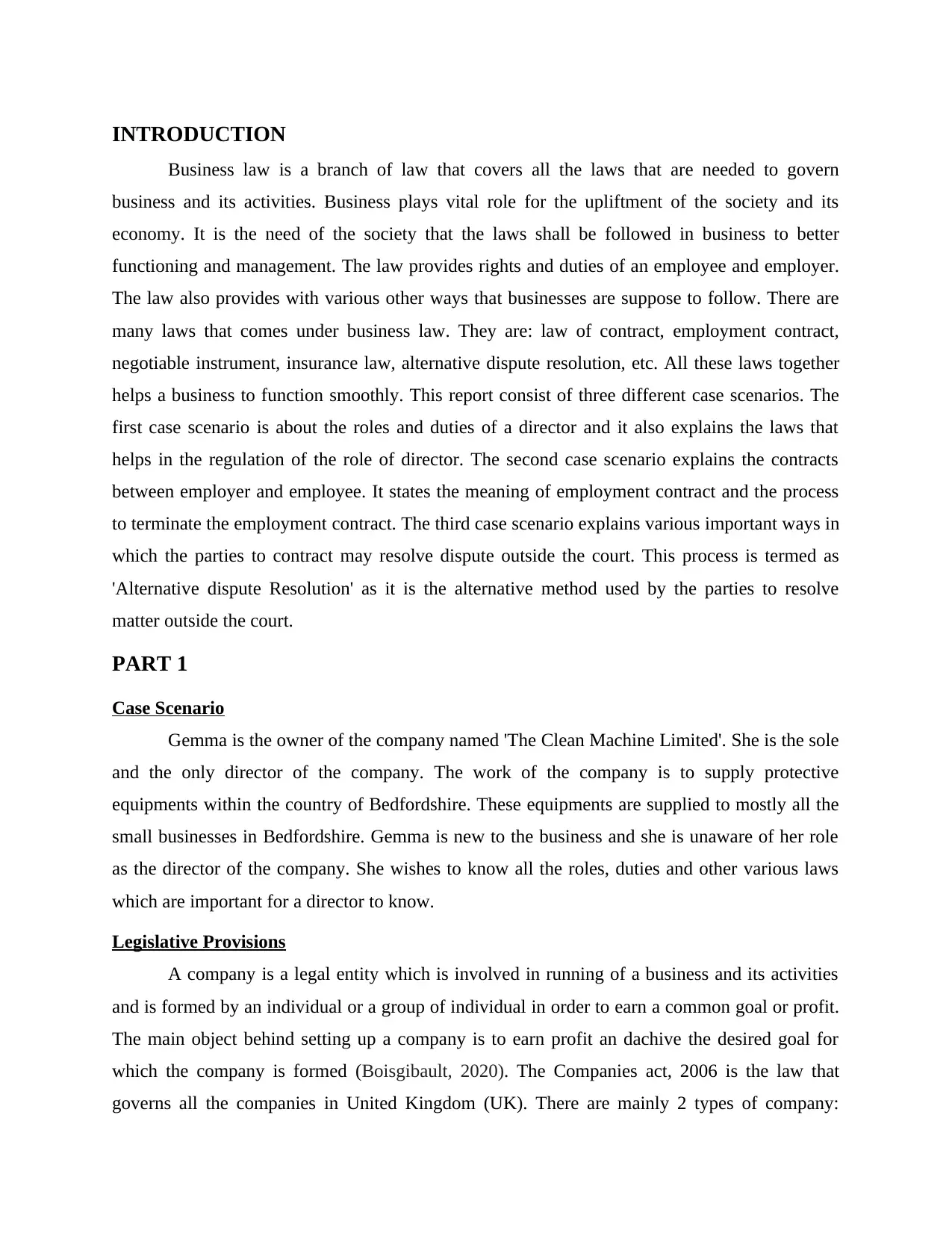
INTRODUCTION
Business law is a branch of law that covers all the laws that are needed to govern
business and its activities. Business plays vital role for the upliftment of the society and its
economy. It is the need of the society that the laws shall be followed in business to better
functioning and management. The law provides rights and duties of an employee and employer.
The law also provides with various other ways that businesses are suppose to follow. There are
many laws that comes under business law. They are: law of contract, employment contract,
negotiable instrument, insurance law, alternative dispute resolution, etc. All these laws together
helps a business to function smoothly. This report consist of three different case scenarios. The
first case scenario is about the roles and duties of a director and it also explains the laws that
helps in the regulation of the role of director. The second case scenario explains the contracts
between employer and employee. It states the meaning of employment contract and the process
to terminate the employment contract. The third case scenario explains various important ways in
which the parties to contract may resolve dispute outside the court. This process is termed as
'Alternative dispute Resolution' as it is the alternative method used by the parties to resolve
matter outside the court.
PART 1
Case Scenario
Gemma is the owner of the company named 'The Clean Machine Limited'. She is the sole
and the only director of the company. The work of the company is to supply protective
equipments within the country of Bedfordshire. These equipments are supplied to mostly all the
small businesses in Bedfordshire. Gemma is new to the business and she is unaware of her role
as the director of the company. She wishes to know all the roles, duties and other various laws
which are important for a director to know.
Legislative Provisions
A company is a legal entity which is involved in running of a business and its activities
and is formed by an individual or a group of individual in order to earn a common goal or profit.
The main object behind setting up a company is to earn profit an dachive the desired goal for
which the company is formed (Boisgibault, 2020). The Companies act, 2006 is the law that
governs all the companies in United Kingdom (UK). There are mainly 2 types of company:
Business law is a branch of law that covers all the laws that are needed to govern
business and its activities. Business plays vital role for the upliftment of the society and its
economy. It is the need of the society that the laws shall be followed in business to better
functioning and management. The law provides rights and duties of an employee and employer.
The law also provides with various other ways that businesses are suppose to follow. There are
many laws that comes under business law. They are: law of contract, employment contract,
negotiable instrument, insurance law, alternative dispute resolution, etc. All these laws together
helps a business to function smoothly. This report consist of three different case scenarios. The
first case scenario is about the roles and duties of a director and it also explains the laws that
helps in the regulation of the role of director. The second case scenario explains the contracts
between employer and employee. It states the meaning of employment contract and the process
to terminate the employment contract. The third case scenario explains various important ways in
which the parties to contract may resolve dispute outside the court. This process is termed as
'Alternative dispute Resolution' as it is the alternative method used by the parties to resolve
matter outside the court.
PART 1
Case Scenario
Gemma is the owner of the company named 'The Clean Machine Limited'. She is the sole
and the only director of the company. The work of the company is to supply protective
equipments within the country of Bedfordshire. These equipments are supplied to mostly all the
small businesses in Bedfordshire. Gemma is new to the business and she is unaware of her role
as the director of the company. She wishes to know all the roles, duties and other various laws
which are important for a director to know.
Legislative Provisions
A company is a legal entity which is involved in running of a business and its activities
and is formed by an individual or a group of individual in order to earn a common goal or profit.
The main object behind setting up a company is to earn profit an dachive the desired goal for
which the company is formed (Boisgibault, 2020). The Companies act, 2006 is the law that
governs all the companies in United Kingdom (UK). There are mainly 2 types of company:
⊘ This is a preview!⊘
Do you want full access?
Subscribe today to unlock all pages.

Trusted by 1+ million students worldwide
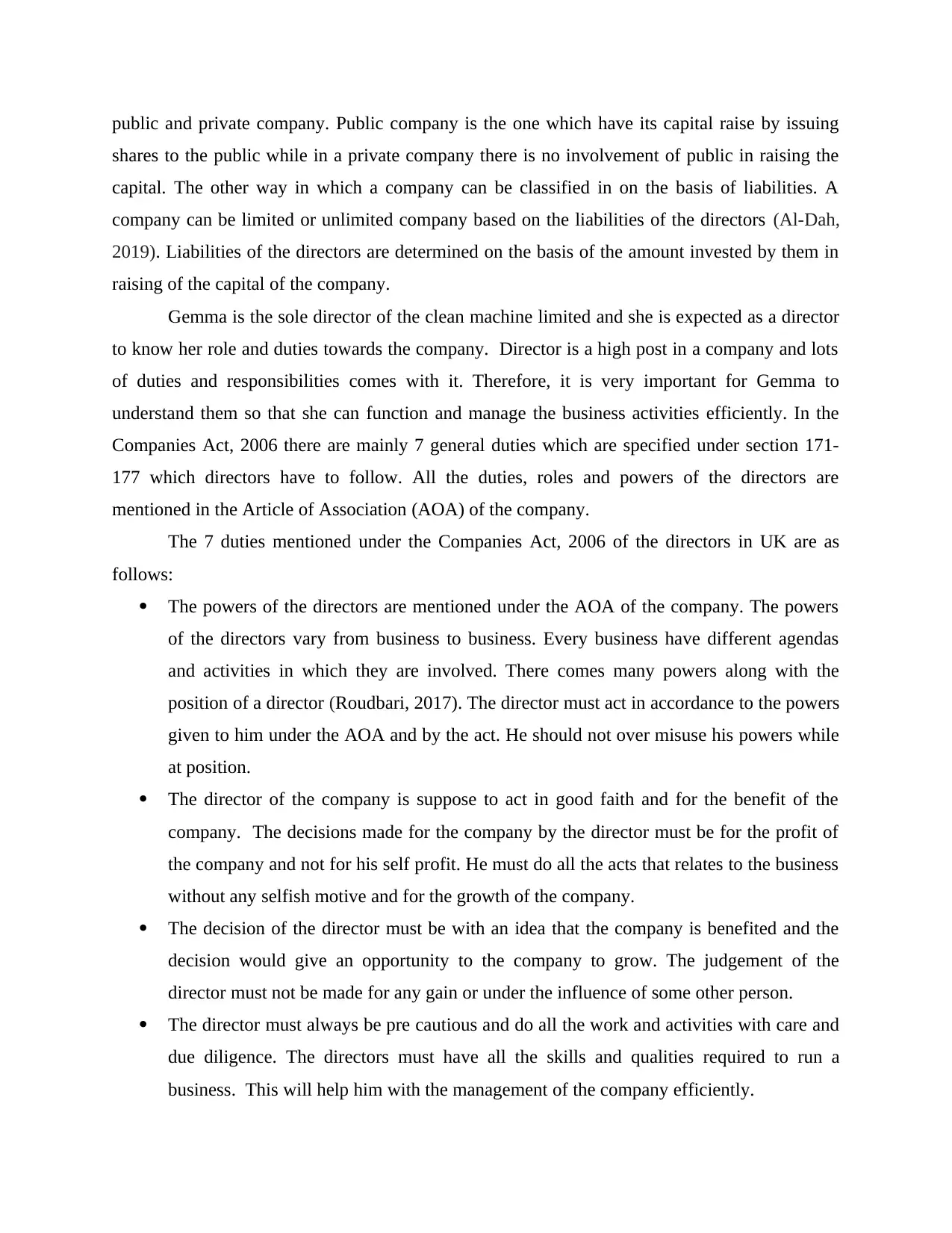
public and private company. Public company is the one which have its capital raise by issuing
shares to the public while in a private company there is no involvement of public in raising the
capital. The other way in which a company can be classified in on the basis of liabilities. A
company can be limited or unlimited company based on the liabilities of the directors (Al-Dah,
2019). Liabilities of the directors are determined on the basis of the amount invested by them in
raising of the capital of the company.
Gemma is the sole director of the clean machine limited and she is expected as a director
to know her role and duties towards the company. Director is a high post in a company and lots
of duties and responsibilities comes with it. Therefore, it is very important for Gemma to
understand them so that she can function and manage the business activities efficiently. In the
Companies Act, 2006 there are mainly 7 general duties which are specified under section 171-
177 which directors have to follow. All the duties, roles and powers of the directors are
mentioned in the Article of Association (AOA) of the company.
The 7 duties mentioned under the Companies Act, 2006 of the directors in UK are as
follows:
The powers of the directors are mentioned under the AOA of the company. The powers
of the directors vary from business to business. Every business have different agendas
and activities in which they are involved. There comes many powers along with the
position of a director (Roudbari, 2017). The director must act in accordance to the powers
given to him under the AOA and by the act. He should not over misuse his powers while
at position.
The director of the company is suppose to act in good faith and for the benefit of the
company. The decisions made for the company by the director must be for the profit of
the company and not for his self profit. He must do all the acts that relates to the business
without any selfish motive and for the growth of the company.
The decision of the director must be with an idea that the company is benefited and the
decision would give an opportunity to the company to grow. The judgement of the
director must not be made for any gain or under the influence of some other person.
The director must always be pre cautious and do all the work and activities with care and
due diligence. The directors must have all the skills and qualities required to run a
business. This will help him with the management of the company efficiently.
shares to the public while in a private company there is no involvement of public in raising the
capital. The other way in which a company can be classified in on the basis of liabilities. A
company can be limited or unlimited company based on the liabilities of the directors (Al-Dah,
2019). Liabilities of the directors are determined on the basis of the amount invested by them in
raising of the capital of the company.
Gemma is the sole director of the clean machine limited and she is expected as a director
to know her role and duties towards the company. Director is a high post in a company and lots
of duties and responsibilities comes with it. Therefore, it is very important for Gemma to
understand them so that she can function and manage the business activities efficiently. In the
Companies Act, 2006 there are mainly 7 general duties which are specified under section 171-
177 which directors have to follow. All the duties, roles and powers of the directors are
mentioned in the Article of Association (AOA) of the company.
The 7 duties mentioned under the Companies Act, 2006 of the directors in UK are as
follows:
The powers of the directors are mentioned under the AOA of the company. The powers
of the directors vary from business to business. Every business have different agendas
and activities in which they are involved. There comes many powers along with the
position of a director (Roudbari, 2017). The director must act in accordance to the powers
given to him under the AOA and by the act. He should not over misuse his powers while
at position.
The director of the company is suppose to act in good faith and for the benefit of the
company. The decisions made for the company by the director must be for the profit of
the company and not for his self profit. He must do all the acts that relates to the business
without any selfish motive and for the growth of the company.
The decision of the director must be with an idea that the company is benefited and the
decision would give an opportunity to the company to grow. The judgement of the
director must not be made for any gain or under the influence of some other person.
The director must always be pre cautious and do all the work and activities with care and
due diligence. The directors must have all the skills and qualities required to run a
business. This will help him with the management of the company efficiently.
Paraphrase This Document
Need a fresh take? Get an instant paraphrase of this document with our AI Paraphraser
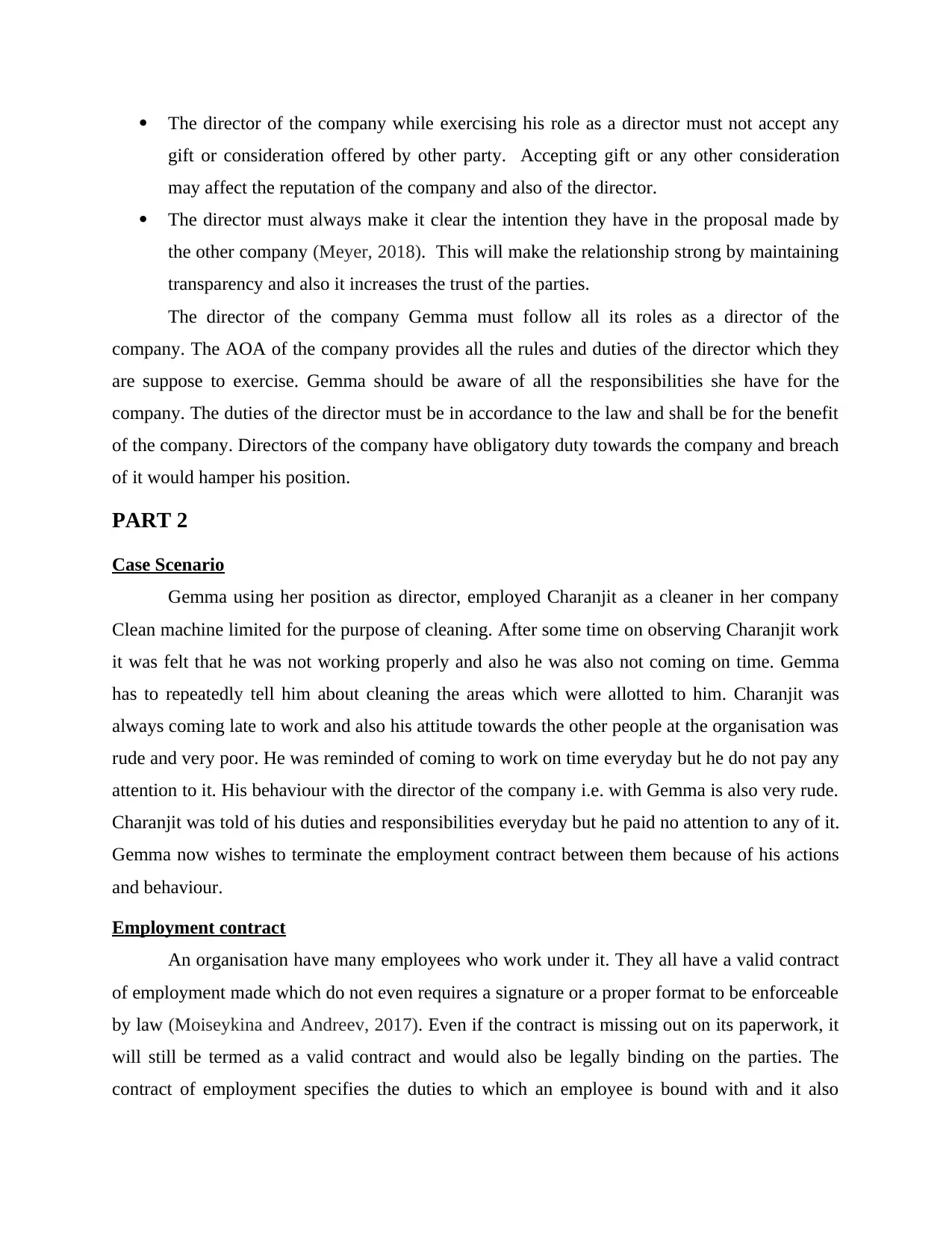
The director of the company while exercising his role as a director must not accept any
gift or consideration offered by other party. Accepting gift or any other consideration
may affect the reputation of the company and also of the director.
The director must always make it clear the intention they have in the proposal made by
the other company (Meyer, 2018). This will make the relationship strong by maintaining
transparency and also it increases the trust of the parties.
The director of the company Gemma must follow all its roles as a director of the
company. The AOA of the company provides all the rules and duties of the director which they
are suppose to exercise. Gemma should be aware of all the responsibilities she have for the
company. The duties of the director must be in accordance to the law and shall be for the benefit
of the company. Directors of the company have obligatory duty towards the company and breach
of it would hamper his position.
PART 2
Case Scenario
Gemma using her position as director, employed Charanjit as a cleaner in her company
Clean machine limited for the purpose of cleaning. After some time on observing Charanjit work
it was felt that he was not working properly and also he was also not coming on time. Gemma
has to repeatedly tell him about cleaning the areas which were allotted to him. Charanjit was
always coming late to work and also his attitude towards the other people at the organisation was
rude and very poor. He was reminded of coming to work on time everyday but he do not pay any
attention to it. His behaviour with the director of the company i.e. with Gemma is also very rude.
Charanjit was told of his duties and responsibilities everyday but he paid no attention to any of it.
Gemma now wishes to terminate the employment contract between them because of his actions
and behaviour.
Employment contract
An organisation have many employees who work under it. They all have a valid contract
of employment made which do not even requires a signature or a proper format to be enforceable
by law (Moiseykina and Andreev, 2017). Even if the contract is missing out on its paperwork, it
will still be termed as a valid contract and would also be legally binding on the parties. The
contract of employment specifies the duties to which an employee is bound with and it also
gift or consideration offered by other party. Accepting gift or any other consideration
may affect the reputation of the company and also of the director.
The director must always make it clear the intention they have in the proposal made by
the other company (Meyer, 2018). This will make the relationship strong by maintaining
transparency and also it increases the trust of the parties.
The director of the company Gemma must follow all its roles as a director of the
company. The AOA of the company provides all the rules and duties of the director which they
are suppose to exercise. Gemma should be aware of all the responsibilities she have for the
company. The duties of the director must be in accordance to the law and shall be for the benefit
of the company. Directors of the company have obligatory duty towards the company and breach
of it would hamper his position.
PART 2
Case Scenario
Gemma using her position as director, employed Charanjit as a cleaner in her company
Clean machine limited for the purpose of cleaning. After some time on observing Charanjit work
it was felt that he was not working properly and also he was also not coming on time. Gemma
has to repeatedly tell him about cleaning the areas which were allotted to him. Charanjit was
always coming late to work and also his attitude towards the other people at the organisation was
rude and very poor. He was reminded of coming to work on time everyday but he do not pay any
attention to it. His behaviour with the director of the company i.e. with Gemma is also very rude.
Charanjit was told of his duties and responsibilities everyday but he paid no attention to any of it.
Gemma now wishes to terminate the employment contract between them because of his actions
and behaviour.
Employment contract
An organisation have many employees who work under it. They all have a valid contract
of employment made which do not even requires a signature or a proper format to be enforceable
by law (Moiseykina and Andreev, 2017). Even if the contract is missing out on its paperwork, it
will still be termed as a valid contract and would also be legally binding on the parties. The
contract of employment specifies the duties to which an employee is bound with and it also
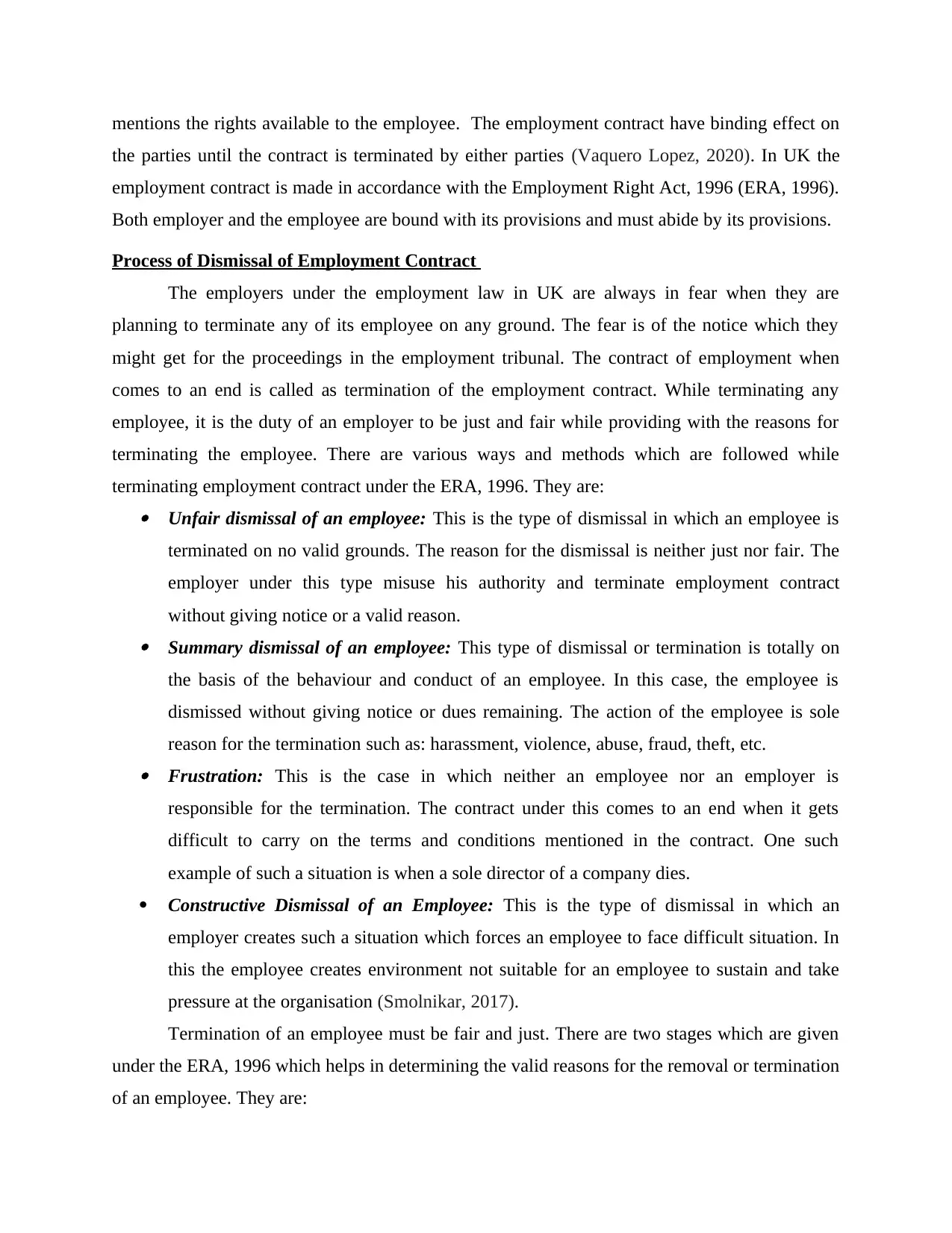
mentions the rights available to the employee. The employment contract have binding effect on
the parties until the contract is terminated by either parties (Vaquero Lopez, 2020). In UK the
employment contract is made in accordance with the Employment Right Act, 1996 (ERA, 1996).
Both employer and the employee are bound with its provisions and must abide by its provisions.
Process of Dismissal of Employment Contract
The employers under the employment law in UK are always in fear when they are
planning to terminate any of its employee on any ground. The fear is of the notice which they
might get for the proceedings in the employment tribunal. The contract of employment when
comes to an end is called as termination of the employment contract. While terminating any
employee, it is the duty of an employer to be just and fair while providing with the reasons for
terminating the employee. There are various ways and methods which are followed while
terminating employment contract under the ERA, 1996. They are: Unfair dismissal of an employee: This is the type of dismissal in which an employee is
terminated on no valid grounds. The reason for the dismissal is neither just nor fair. The
employer under this type misuse his authority and terminate employment contract
without giving notice or a valid reason. Summary dismissal of an employee: This type of dismissal or termination is totally on
the basis of the behaviour and conduct of an employee. In this case, the employee is
dismissed without giving notice or dues remaining. The action of the employee is sole
reason for the termination such as: harassment, violence, abuse, fraud, theft, etc. Frustration: This is the case in which neither an employee nor an employer is
responsible for the termination. The contract under this comes to an end when it gets
difficult to carry on the terms and conditions mentioned in the contract. One such
example of such a situation is when a sole director of a company dies.
Constructive Dismissal of an Employee: This is the type of dismissal in which an
employer creates such a situation which forces an employee to face difficult situation. In
this the employee creates environment not suitable for an employee to sustain and take
pressure at the organisation (Smolnikar, 2017).
Termination of an employee must be fair and just. There are two stages which are given
under the ERA, 1996 which helps in determining the valid reasons for the removal or termination
of an employee. They are:
the parties until the contract is terminated by either parties (Vaquero Lopez, 2020). In UK the
employment contract is made in accordance with the Employment Right Act, 1996 (ERA, 1996).
Both employer and the employee are bound with its provisions and must abide by its provisions.
Process of Dismissal of Employment Contract
The employers under the employment law in UK are always in fear when they are
planning to terminate any of its employee on any ground. The fear is of the notice which they
might get for the proceedings in the employment tribunal. The contract of employment when
comes to an end is called as termination of the employment contract. While terminating any
employee, it is the duty of an employer to be just and fair while providing with the reasons for
terminating the employee. There are various ways and methods which are followed while
terminating employment contract under the ERA, 1996. They are: Unfair dismissal of an employee: This is the type of dismissal in which an employee is
terminated on no valid grounds. The reason for the dismissal is neither just nor fair. The
employer under this type misuse his authority and terminate employment contract
without giving notice or a valid reason. Summary dismissal of an employee: This type of dismissal or termination is totally on
the basis of the behaviour and conduct of an employee. In this case, the employee is
dismissed without giving notice or dues remaining. The action of the employee is sole
reason for the termination such as: harassment, violence, abuse, fraud, theft, etc. Frustration: This is the case in which neither an employee nor an employer is
responsible for the termination. The contract under this comes to an end when it gets
difficult to carry on the terms and conditions mentioned in the contract. One such
example of such a situation is when a sole director of a company dies.
Constructive Dismissal of an Employee: This is the type of dismissal in which an
employer creates such a situation which forces an employee to face difficult situation. In
this the employee creates environment not suitable for an employee to sustain and take
pressure at the organisation (Smolnikar, 2017).
Termination of an employee must be fair and just. There are two stages which are given
under the ERA, 1996 which helps in determining the valid reasons for the removal or termination
of an employee. They are:
⊘ This is a preview!⊘
Do you want full access?
Subscribe today to unlock all pages.

Trusted by 1+ million students worldwide
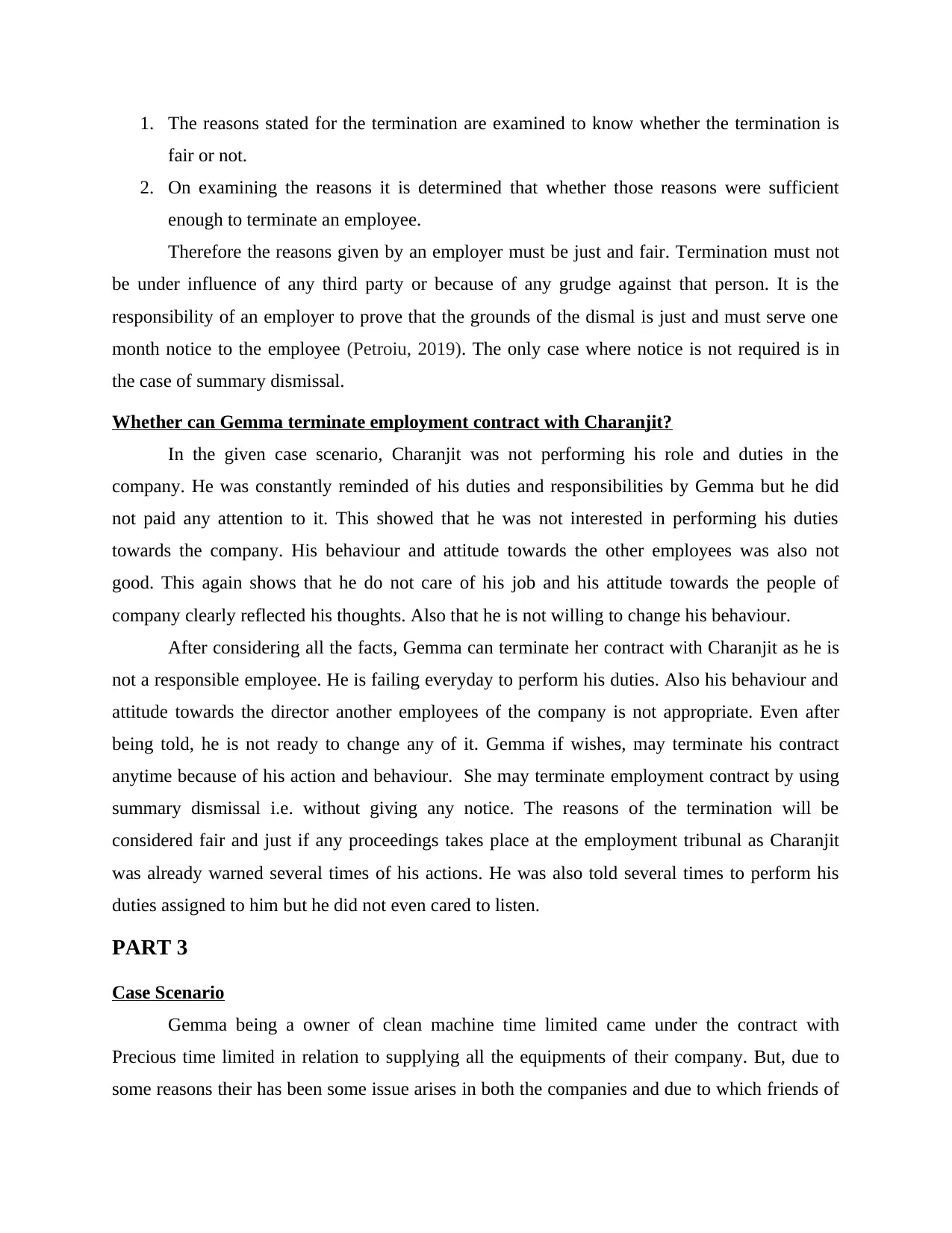
1. The reasons stated for the termination are examined to know whether the termination is
fair or not.
2. On examining the reasons it is determined that whether those reasons were sufficient
enough to terminate an employee.
Therefore the reasons given by an employer must be just and fair. Termination must not
be under influence of any third party or because of any grudge against that person. It is the
responsibility of an employer to prove that the grounds of the dismal is just and must serve one
month notice to the employee (Petroiu, 2019). The only case where notice is not required is in
the case of summary dismissal.
Whether can Gemma terminate employment contract with Charanjit?
In the given case scenario, Charanjit was not performing his role and duties in the
company. He was constantly reminded of his duties and responsibilities by Gemma but he did
not paid any attention to it. This showed that he was not interested in performing his duties
towards the company. His behaviour and attitude towards the other employees was also not
good. This again shows that he do not care of his job and his attitude towards the people of
company clearly reflected his thoughts. Also that he is not willing to change his behaviour.
After considering all the facts, Gemma can terminate her contract with Charanjit as he is
not a responsible employee. He is failing everyday to perform his duties. Also his behaviour and
attitude towards the director another employees of the company is not appropriate. Even after
being told, he is not ready to change any of it. Gemma if wishes, may terminate his contract
anytime because of his action and behaviour. She may terminate employment contract by using
summary dismissal i.e. without giving any notice. The reasons of the termination will be
considered fair and just if any proceedings takes place at the employment tribunal as Charanjit
was already warned several times of his actions. He was also told several times to perform his
duties assigned to him but he did not even cared to listen.
PART 3
Case Scenario
Gemma being a owner of clean machine time limited came under the contract with
Precious time limited in relation to supplying all the equipments of their company. But, due to
some reasons their has been some issue arises in both the companies and due to which friends of
fair or not.
2. On examining the reasons it is determined that whether those reasons were sufficient
enough to terminate an employee.
Therefore the reasons given by an employer must be just and fair. Termination must not
be under influence of any third party or because of any grudge against that person. It is the
responsibility of an employer to prove that the grounds of the dismal is just and must serve one
month notice to the employee (Petroiu, 2019). The only case where notice is not required is in
the case of summary dismissal.
Whether can Gemma terminate employment contract with Charanjit?
In the given case scenario, Charanjit was not performing his role and duties in the
company. He was constantly reminded of his duties and responsibilities by Gemma but he did
not paid any attention to it. This showed that he was not interested in performing his duties
towards the company. His behaviour and attitude towards the other employees was also not
good. This again shows that he do not care of his job and his attitude towards the people of
company clearly reflected his thoughts. Also that he is not willing to change his behaviour.
After considering all the facts, Gemma can terminate her contract with Charanjit as he is
not a responsible employee. He is failing everyday to perform his duties. Also his behaviour and
attitude towards the director another employees of the company is not appropriate. Even after
being told, he is not ready to change any of it. Gemma if wishes, may terminate his contract
anytime because of his action and behaviour. She may terminate employment contract by using
summary dismissal i.e. without giving any notice. The reasons of the termination will be
considered fair and just if any proceedings takes place at the employment tribunal as Charanjit
was already warned several times of his actions. He was also told several times to perform his
duties assigned to him but he did not even cared to listen.
PART 3
Case Scenario
Gemma being a owner of clean machine time limited came under the contract with
Precious time limited in relation to supplying all the equipments of their company. But, due to
some reasons their has been some issue arises in both the companies and due to which friends of
Paraphrase This Document
Need a fresh take? Get an instant paraphrase of this document with our AI Paraphraser
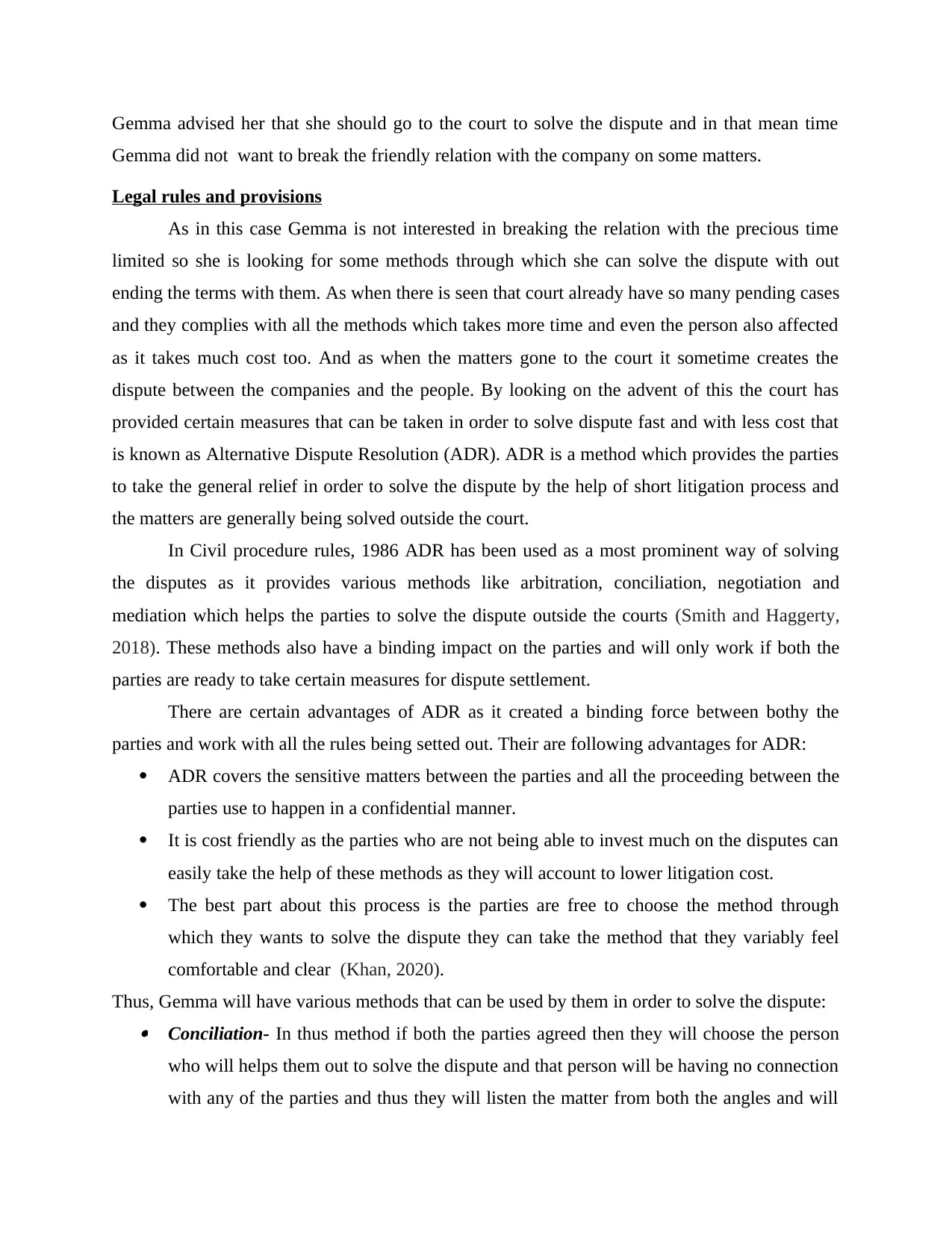
Gemma advised her that she should go to the court to solve the dispute and in that mean time
Gemma did not want to break the friendly relation with the company on some matters.
Legal rules and provisions
As in this case Gemma is not interested in breaking the relation with the precious time
limited so she is looking for some methods through which she can solve the dispute with out
ending the terms with them. As when there is seen that court already have so many pending cases
and they complies with all the methods which takes more time and even the person also affected
as it takes much cost too. And as when the matters gone to the court it sometime creates the
dispute between the companies and the people. By looking on the advent of this the court has
provided certain measures that can be taken in order to solve dispute fast and with less cost that
is known as Alternative Dispute Resolution (ADR). ADR is a method which provides the parties
to take the general relief in order to solve the dispute by the help of short litigation process and
the matters are generally being solved outside the court.
In Civil procedure rules, 1986 ADR has been used as a most prominent way of solving
the disputes as it provides various methods like arbitration, conciliation, negotiation and
mediation which helps the parties to solve the dispute outside the courts (Smith and Haggerty,
2018). These methods also have a binding impact on the parties and will only work if both the
parties are ready to take certain measures for dispute settlement.
There are certain advantages of ADR as it created a binding force between bothy the
parties and work with all the rules being setted out. Their are following advantages for ADR:
ADR covers the sensitive matters between the parties and all the proceeding between the
parties use to happen in a confidential manner.
It is cost friendly as the parties who are not being able to invest much on the disputes can
easily take the help of these methods as they will account to lower litigation cost.
The best part about this process is the parties are free to choose the method through
which they wants to solve the dispute they can take the method that they variably feel
comfortable and clear (Khan, 2020).
Thus, Gemma will have various methods that can be used by them in order to solve the dispute: Conciliation- In thus method if both the parties agreed then they will choose the person
who will helps them out to solve the dispute and that person will be having no connection
with any of the parties and thus they will listen the matter from both the angles and will
Gemma did not want to break the friendly relation with the company on some matters.
Legal rules and provisions
As in this case Gemma is not interested in breaking the relation with the precious time
limited so she is looking for some methods through which she can solve the dispute with out
ending the terms with them. As when there is seen that court already have so many pending cases
and they complies with all the methods which takes more time and even the person also affected
as it takes much cost too. And as when the matters gone to the court it sometime creates the
dispute between the companies and the people. By looking on the advent of this the court has
provided certain measures that can be taken in order to solve dispute fast and with less cost that
is known as Alternative Dispute Resolution (ADR). ADR is a method which provides the parties
to take the general relief in order to solve the dispute by the help of short litigation process and
the matters are generally being solved outside the court.
In Civil procedure rules, 1986 ADR has been used as a most prominent way of solving
the disputes as it provides various methods like arbitration, conciliation, negotiation and
mediation which helps the parties to solve the dispute outside the courts (Smith and Haggerty,
2018). These methods also have a binding impact on the parties and will only work if both the
parties are ready to take certain measures for dispute settlement.
There are certain advantages of ADR as it created a binding force between bothy the
parties and work with all the rules being setted out. Their are following advantages for ADR:
ADR covers the sensitive matters between the parties and all the proceeding between the
parties use to happen in a confidential manner.
It is cost friendly as the parties who are not being able to invest much on the disputes can
easily take the help of these methods as they will account to lower litigation cost.
The best part about this process is the parties are free to choose the method through
which they wants to solve the dispute they can take the method that they variably feel
comfortable and clear (Khan, 2020).
Thus, Gemma will have various methods that can be used by them in order to solve the dispute: Conciliation- In thus method if both the parties agreed then they will choose the person
who will helps them out to solve the dispute and that person will be having no connection
with any of the parties and thus they will listen the matter from both the angles and will
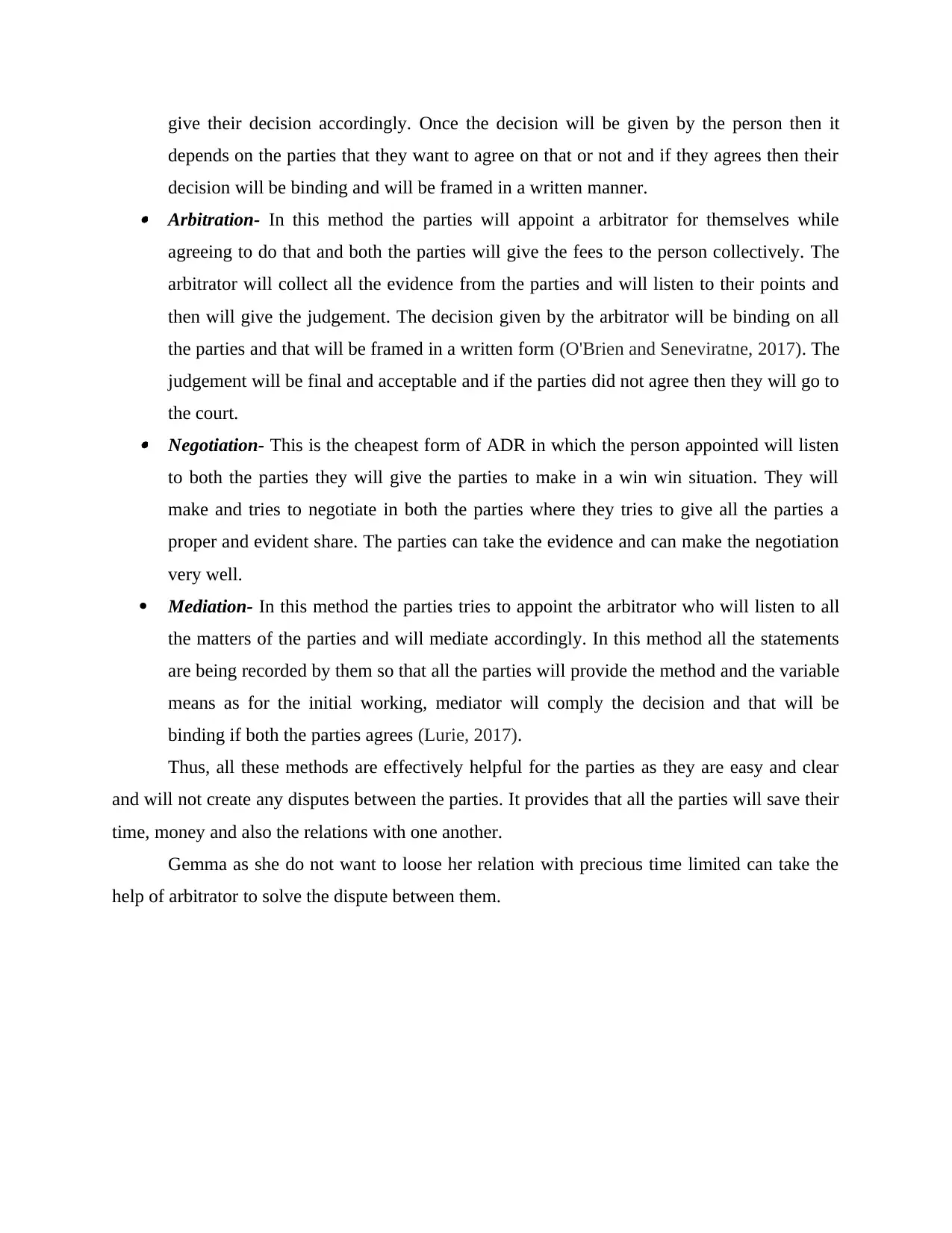
give their decision accordingly. Once the decision will be given by the person then it
depends on the parties that they want to agree on that or not and if they agrees then their
decision will be binding and will be framed in a written manner. Arbitration- In this method the parties will appoint a arbitrator for themselves while
agreeing to do that and both the parties will give the fees to the person collectively. The
arbitrator will collect all the evidence from the parties and will listen to their points and
then will give the judgement. The decision given by the arbitrator will be binding on all
the parties and that will be framed in a written form (O'Brien and Seneviratne, 2017). The
judgement will be final and acceptable and if the parties did not agree then they will go to
the court. Negotiation- This is the cheapest form of ADR in which the person appointed will listen
to both the parties they will give the parties to make in a win win situation. They will
make and tries to negotiate in both the parties where they tries to give all the parties a
proper and evident share. The parties can take the evidence and can make the negotiation
very well.
Mediation- In this method the parties tries to appoint the arbitrator who will listen to all
the matters of the parties and will mediate accordingly. In this method all the statements
are being recorded by them so that all the parties will provide the method and the variable
means as for the initial working, mediator will comply the decision and that will be
binding if both the parties agrees (Lurie, 2017).
Thus, all these methods are effectively helpful for the parties as they are easy and clear
and will not create any disputes between the parties. It provides that all the parties will save their
time, money and also the relations with one another.
Gemma as she do not want to loose her relation with precious time limited can take the
help of arbitrator to solve the dispute between them.
depends on the parties that they want to agree on that or not and if they agrees then their
decision will be binding and will be framed in a written manner. Arbitration- In this method the parties will appoint a arbitrator for themselves while
agreeing to do that and both the parties will give the fees to the person collectively. The
arbitrator will collect all the evidence from the parties and will listen to their points and
then will give the judgement. The decision given by the arbitrator will be binding on all
the parties and that will be framed in a written form (O'Brien and Seneviratne, 2017). The
judgement will be final and acceptable and if the parties did not agree then they will go to
the court. Negotiation- This is the cheapest form of ADR in which the person appointed will listen
to both the parties they will give the parties to make in a win win situation. They will
make and tries to negotiate in both the parties where they tries to give all the parties a
proper and evident share. The parties can take the evidence and can make the negotiation
very well.
Mediation- In this method the parties tries to appoint the arbitrator who will listen to all
the matters of the parties and will mediate accordingly. In this method all the statements
are being recorded by them so that all the parties will provide the method and the variable
means as for the initial working, mediator will comply the decision and that will be
binding if both the parties agrees (Lurie, 2017).
Thus, all these methods are effectively helpful for the parties as they are easy and clear
and will not create any disputes between the parties. It provides that all the parties will save their
time, money and also the relations with one another.
Gemma as she do not want to loose her relation with precious time limited can take the
help of arbitrator to solve the dispute between them.
⊘ This is a preview!⊘
Do you want full access?
Subscribe today to unlock all pages.

Trusted by 1+ million students worldwide
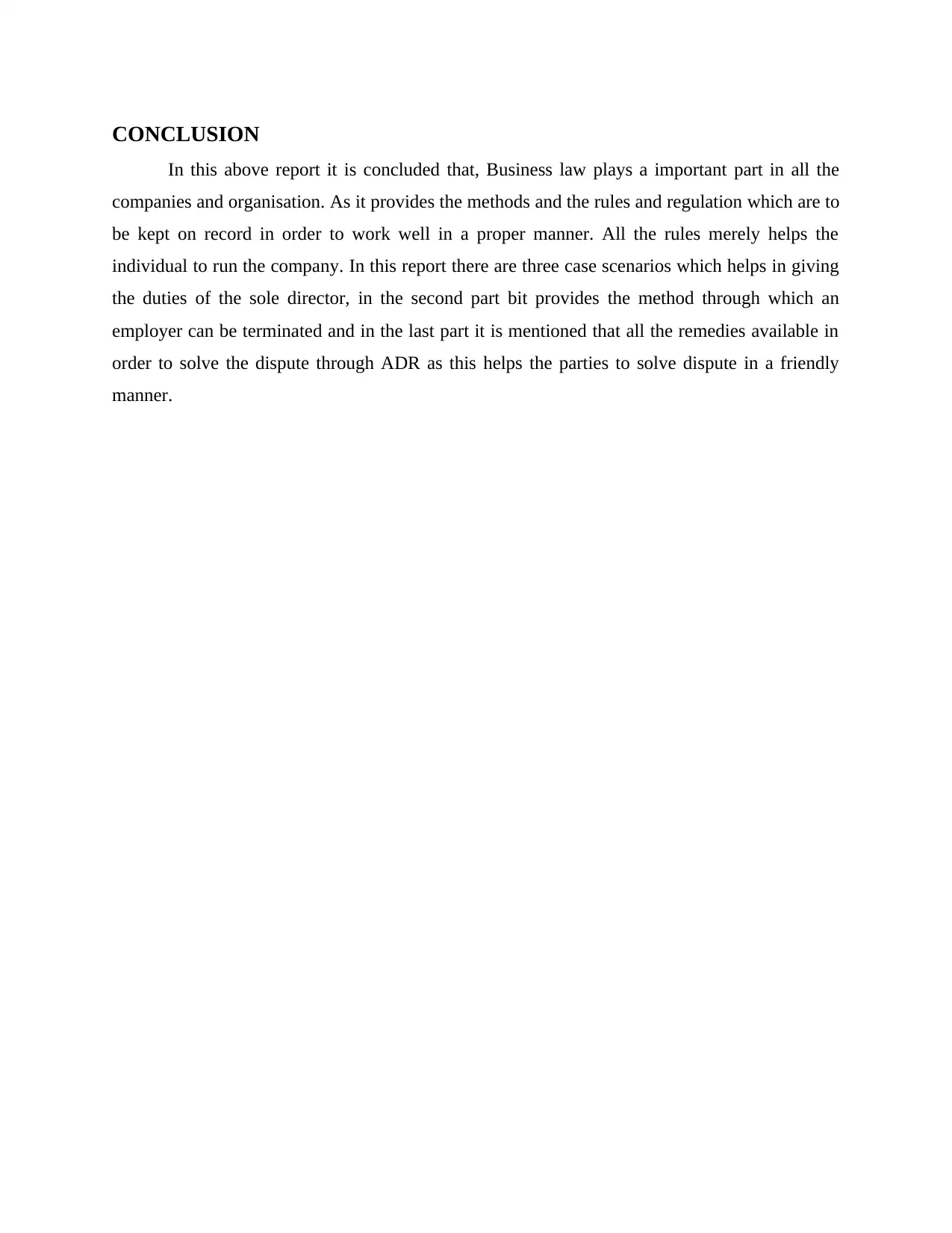
CONCLUSION
In this above report it is concluded that, Business law plays a important part in all the
companies and organisation. As it provides the methods and the rules and regulation which are to
be kept on record in order to work well in a proper manner. All the rules merely helps the
individual to run the company. In this report there are three case scenarios which helps in giving
the duties of the sole director, in the second part bit provides the method through which an
employer can be terminated and in the last part it is mentioned that all the remedies available in
order to solve the dispute through ADR as this helps the parties to solve dispute in a friendly
manner.
In this above report it is concluded that, Business law plays a important part in all the
companies and organisation. As it provides the methods and the rules and regulation which are to
be kept on record in order to work well in a proper manner. All the rules merely helps the
individual to run the company. In this report there are three case scenarios which helps in giving
the duties of the sole director, in the second part bit provides the method through which an
employer can be terminated and in the last part it is mentioned that all the remedies available in
order to solve the dispute through ADR as this helps the parties to solve dispute in a friendly
manner.
Paraphrase This Document
Need a fresh take? Get an instant paraphrase of this document with our AI Paraphraser
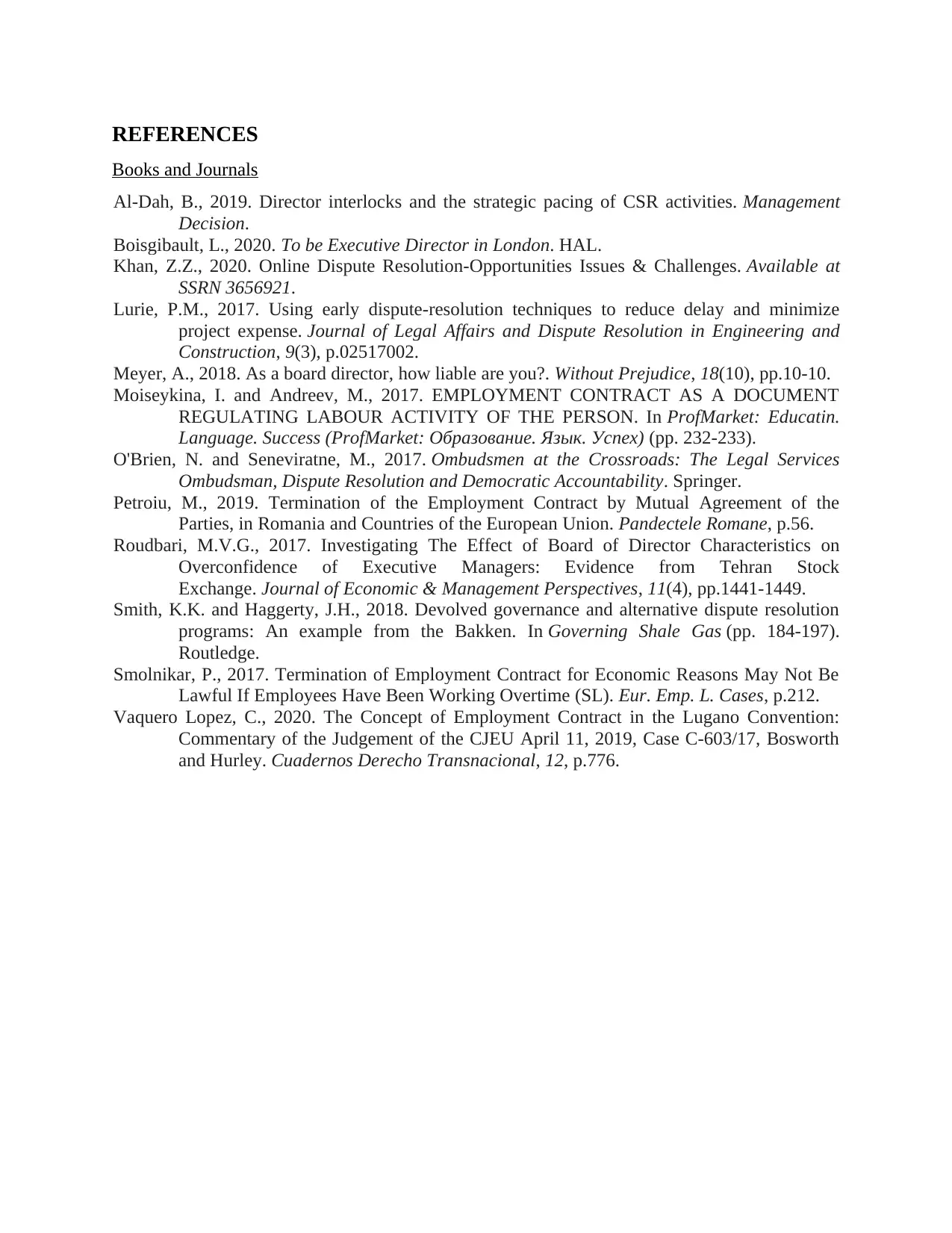
REFERENCES
Books and Journals
Al-Dah, B., 2019. Director interlocks and the strategic pacing of CSR activities. Management
Decision.
Boisgibault, L., 2020. To be Executive Director in London. HAL.
Khan, Z.Z., 2020. Online Dispute Resolution-Opportunities Issues & Challenges. Available at
SSRN 3656921.
Lurie, P.M., 2017. Using early dispute-resolution techniques to reduce delay and minimize
project expense. Journal of Legal Affairs and Dispute Resolution in Engineering and
Construction, 9(3), p.02517002.
Meyer, A., 2018. As a board director, how liable are you?. Without Prejudice, 18(10), pp.10-10.
Moiseykina, I. and Andreev, M., 2017. EMPLOYMENT CONTRACT AS A DOCUMENT
REGULATING LABOUR ACTIVITY OF THE PERSON. In ProfMarket: Educatin.
Language. Success (ProfMarket: Образование. Язык. Успех) (pp. 232-233).
O'Brien, N. and Seneviratne, M., 2017. Ombudsmen at the Crossroads: The Legal Services
Ombudsman, Dispute Resolution and Democratic Accountability. Springer.
Petroiu, M., 2019. Termination of the Employment Contract by Mutual Agreement of the
Parties, in Romania and Countries of the European Union. Pandectele Romane, p.56.
Roudbari, M.V.G., 2017. Investigating The Effect of Board of Director Characteristics on
Overconfidence of Executive Managers: Evidence from Tehran Stock
Exchange. Journal of Economic & Management Perspectives, 11(4), pp.1441-1449.
Smith, K.K. and Haggerty, J.H., 2018. Devolved governance and alternative dispute resolution
programs: An example from the Bakken. In Governing Shale Gas (pp. 184-197).
Routledge.
Smolnikar, P., 2017. Termination of Employment Contract for Economic Reasons May Not Be
Lawful If Employees Have Been Working Overtime (SL). Eur. Emp. L. Cases, p.212.
Vaquero Lopez, C., 2020. The Concept of Employment Contract in the Lugano Convention:
Commentary of the Judgement of the CJEU April 11, 2019, Case C-603/17, Bosworth
and Hurley. Cuadernos Derecho Transnacional, 12, p.776.
Books and Journals
Al-Dah, B., 2019. Director interlocks and the strategic pacing of CSR activities. Management
Decision.
Boisgibault, L., 2020. To be Executive Director in London. HAL.
Khan, Z.Z., 2020. Online Dispute Resolution-Opportunities Issues & Challenges. Available at
SSRN 3656921.
Lurie, P.M., 2017. Using early dispute-resolution techniques to reduce delay and minimize
project expense. Journal of Legal Affairs and Dispute Resolution in Engineering and
Construction, 9(3), p.02517002.
Meyer, A., 2018. As a board director, how liable are you?. Without Prejudice, 18(10), pp.10-10.
Moiseykina, I. and Andreev, M., 2017. EMPLOYMENT CONTRACT AS A DOCUMENT
REGULATING LABOUR ACTIVITY OF THE PERSON. In ProfMarket: Educatin.
Language. Success (ProfMarket: Образование. Язык. Успех) (pp. 232-233).
O'Brien, N. and Seneviratne, M., 2017. Ombudsmen at the Crossroads: The Legal Services
Ombudsman, Dispute Resolution and Democratic Accountability. Springer.
Petroiu, M., 2019. Termination of the Employment Contract by Mutual Agreement of the
Parties, in Romania and Countries of the European Union. Pandectele Romane, p.56.
Roudbari, M.V.G., 2017. Investigating The Effect of Board of Director Characteristics on
Overconfidence of Executive Managers: Evidence from Tehran Stock
Exchange. Journal of Economic & Management Perspectives, 11(4), pp.1441-1449.
Smith, K.K. and Haggerty, J.H., 2018. Devolved governance and alternative dispute resolution
programs: An example from the Bakken. In Governing Shale Gas (pp. 184-197).
Routledge.
Smolnikar, P., 2017. Termination of Employment Contract for Economic Reasons May Not Be
Lawful If Employees Have Been Working Overtime (SL). Eur. Emp. L. Cases, p.212.
Vaquero Lopez, C., 2020. The Concept of Employment Contract in the Lugano Convention:
Commentary of the Judgement of the CJEU April 11, 2019, Case C-603/17, Bosworth
and Hurley. Cuadernos Derecho Transnacional, 12, p.776.
1 out of 11
Related Documents
Your All-in-One AI-Powered Toolkit for Academic Success.
+13062052269
info@desklib.com
Available 24*7 on WhatsApp / Email
![[object Object]](/_next/static/media/star-bottom.7253800d.svg)
Unlock your academic potential
Copyright © 2020–2026 A2Z Services. All Rights Reserved. Developed and managed by ZUCOL.





